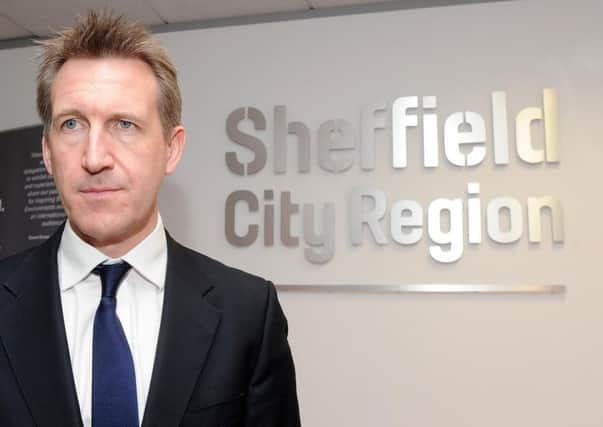Yorkshire must have fair share of post-Brexit funding to replace EU millions - Dan Jarvis


That’s why the UK Shared Prosperity Fund is so crucial. It will replace European funding, the Government’s Local Growth Fund (LGF) programme, and other funds which have together ploughed billions into our regions.
I’ve been working to get the Government to use the introduction of the Shared Prosperity Fund as an opportunity to press the reset button on the way funding is allocated. I believe any future Shared Prosperity Fund needs to replace existing funds on the basis of what would have been received had the referendum result been different.
Advertisement
Hide AdAdvertisement
Hide AdThe current European funding programme alone has been worth 796m euros for Yorkshire and the Humber. If we were remaining in the European Union, research produced by the Conference of Peripheral Maritime Regions suggests that the UK regions would receive 13bn euros under the future EU Cohesion programme – that’s 22 per cent more than the current programme.


There would also have been an even greater proportional increase for regions such as South Yorkshire, which would have seen an increase from 117 euros per head to more than 500.
These are resources that support some of the most vulnerable in society, but also support investment in multi-million-pound research and innovation schemes. They unlock town and city regeneration, they provide business support and finance, and they deliver sustainable development projects.
As Mayor, I’m delivering transformative schemes only be made possible by LGF funding. These range from the DN7 Hatfield Link Road in Doncaster to the Glass Works development in Barnsley; the Grey to Green public realm works in Sheffield to the Gulliver’s Valley resort in Rotherham. Taken together, these LGF and European funds have been the glue, helping to hold together our communities. They have narrowed the gap between the more affluent parts of our country and those regions that have struggled through generations of under-investment.
Advertisement
Hide AdAdvertisement
Hide AdBut I believe that we must now think and do differently. This issue is particularly stark when considering how successive governments have decided where to prioritise investment.
Since the Northern Powerhouse was introduced in 2014, public transport investment per person has been three times higher in London than Yorkshire and the Humber. These inequalities are built into the criteria of the Treasury model, which tends to favour infrastructure development in more affluent areas – meeting existing demand rather than stimulating latent potential.
If we fix this, the prize for doing so is huge. Looking just at the North of England, Transport for the North’s Northern Powerhouse Independent Economic Review suggests that we could add an additional £97bn, and 850,000 jobs, to our economy by 2050. Change is afoot and there is a growing recognition that the answers do not lie in Westminster or Whitehall. It lies with our Metro Mayors across England; with those regional leaders who know their communities best.
The Shared Prosperity Fund must be part of the solution. That’s why I’m pressing Government on the issue, and have set out my own four guiding principles upon which the fund should be developed.
Advertisement
Hide AdAdvertisement
Hide AdThe first is that the annual budget for the Shared Prosperity Fund should be no less, in real terms, than both the EU and Local Growth Funding streams it replaces.
The second is that there should also be no competitive bidding element. Instead, an open and transparent process must be put in place that strikes the balance between targeting areas of need, of the need to rebalance our economy and support those economies with the greatest potential to grow.
The third is that the fund must be fully devolved to those areas who have in place robust, democratically accountable governance models, including Devolved Administrations, Combined Authorities and Mayoralties.
Finally, the funding must be stretched over multiple years, beyond the vagaries of Government Spending Reviews and Parliamentary cycles.
Advertisement
Hide AdAdvertisement
Hide AdThe effectiveness and fairness of the Shared Prosperity Fund will be a litmus test for this Government’s commitment to devolution. Let us make sure that the Shared Prosperity Fund does what it says on the tin, enabling all of our communities to share and prosper in the UK’s future economic growth.
Dan Jarvis is Mayor of the Sheffield City Region and Labour MP for Barnsley Central.